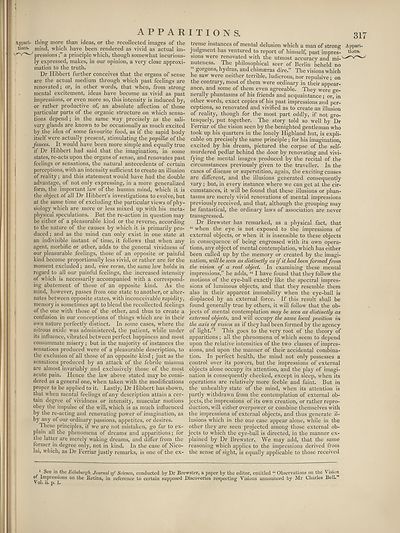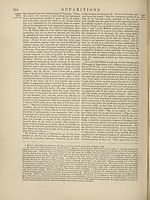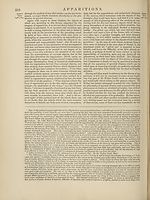Encyclopaedia Britannica > Volume 3, Anatomy-Astronomy
(325) Page 317
Download files
Complete book:
Individual page:
Thumbnail gallery: Grid view | List view

*
A P P A R
\ppari- thing more than ideas, or the recollected images of the
tions. mind, which have been rendered as vivid as actual im-
pressionsa principle which, though somewhat incurious¬
ly expressed, makes, in our opinion, a very close approxi¬
mation to the truth.
Dr Hibbert further conceives that the organs of sense
are the actual medium through which past feelings are
renovated; or, in other words, that when, from strong
mental excitement, ideas have become as vivid as past
impressions, or even more so, this intensity is induced by,
or rather productive of, an absolute affection of those
particular parts of the organic structure on which sensa¬
tions depend; in the same wray precisely as the sali¬
vary glands are known to be occasionally as much excited
by the idea of some favourite food, as if the sapid body
itself were actually present, stimulating the papilla of the
fauces. It would have been more simple and equally true
if Dr Hibbert had said that the imagination, in some
states, re-acts upon the organs of sense, and renovates past
feelings or sensations, the natural antecedents of certain
perceptions, with an intensit}' sufficient to create an illusion
of reality; and this statement would have had the double
advantage, of not only expressing, in a more generalized
form, the important law of the human mind, which it is
the object of all Dr Hibbert’s investigations to evolve, but
at the same time of excluding the particular views of phy¬
siology which are more or less mixed up with his meta¬
physical speculations. But the re-action in question may
be either of a pleasurable kind or the reverse, according
to the nature of the causes by which it is primarily pro¬
duced ; and as the mind can only exist in one state at
an indivisible instant of time, it follows that when any
agent, morbific or other, adds to the general vividness of
our pleasurable feelings, those of an opposite or painful
kind become proportionally less vivid, or rather are for the
moment excluded ; and, vice versa, the same law holds in
regard to all our painful feelings, the increased intensity
of which is necessarily accompanied with a correspond¬
ing abatement of those of an opposite kind. As the
mind, however, passes from one state to another, or alter¬
nates between opposite states, with inconceivable rapidity,
memory is sometimes apt to blend the recollected feelings
of the one with those of the other, and thus to create a
confusion in our conceptions of things which are in their
own nature perfectly distinct. In some cases, where the
nitrous oxide was administered, the patient, while under
its influence, vibrated between perfect happiness and most
consummate misery; but in the majority of instances the
sensations produced were of a pleasurable description, to
the exclusion of all those of an opposite kind; just as the
sensations produced by an attack of the febrile miasma
are almost invariably and exclusively those of the most
acute pain. Hence the law above stated may be consi¬
dered as a general one, when taken with the modifications
proper to be applied to it. Lastly, Dr Hibbert has shown,
that when mental feelings of any description attain a cer¬
tain degree of vividness or intensity, muscular motions
obey the impulse of the will, which is as much influenced
by the re-acting and renovating power of imagination, as
by any of our ordinary passions, appetites, or desires.
Ihese principles, if we are not mistaken, go far to ex¬
plain all the phenomena of dreams and apparitions; for
the latter are merely waking dreams, and differ from the
former in degree only, not in kind. In the case of Nico¬
lai, which, as Dr Ferriar justly remarks, is one of the ex-
I T I O N S. 3i>
tieme instances of mental delusion which a man of strong ApparU
judgment has ventured to report of himself, past impres- tions.
sions were renovated with the utmost accuracy and mi-
nuteness. The philosophical seer of Berlin beheld no
“ gorgons, hydras, and chimaeras dire.” The visions which
he saw were neither terrible, ludicrous, nor repulsive; on
the contrary, most of them were ordinary in their appear¬
ance, and some of them even agreeable. They were ge¬
nerally phantasms of his friends and acquaintance; orf in
other words, exact copies of his past impressions and per¬
ceptions, so renovated and vivified as to create an illusion
of reality, though for the most part oddly, if not gro¬
tesquely, put together. The story told so well by Dr
Ferriar of the vision seen by the benighted gentleman who
took up his quarters in the lonely Highland hut, is expli¬
cable on precisely the same principle; for his imagination,
excited by his dream, pictured the corpse of the self-
murdered pedlar behind the door by renovating and vivi¬
fying the mental images produced by the recital of the
circumstances previously given to the traveller. In the
cases of disease or superstition, again, the exciting causes
are different, and the illusions generated consequently
vary ; but, in every instance where we can get at the cir¬
cumstances, it will be found that these illusions or phan¬
tasms are merely vivid renovations of mental impressions
previously received, and that, although the grouping may
be fantastical, the ordinary laws of association are never
transgressed.
Dr Brewster has remarked, as a physical fact, that
“ when the eye is not exposed to the impressions of
external objects, or when it is insensible to these objects
in consequence of being engrossed with its own opera¬
tions, any object of mental contemplation, which has either
been called up by the memory or created by the imagi¬
nation, will be seen as distinctly as if it had been formed from
the vision of a real object. In examining these mental
impressions,” he adds, “ I have found that they follow the
motions of the eye-ball exactly like the spectral impres¬
sions of luminous objects, and that they resemble them
also in their apparent immobility when the eye-ball is
displaced by an external force. If this result shall be
found generally true by others, it will follow that the ob¬
jects of mental contemplation may be seen as distinctly as
external objects, and will occupy the same local position in
the axis of vision as if they had been formed by the agency
of light.”1 This goes to the very root of the theory of
apparitions; all the phenomena of which seem to depend
upon the relative intensities of the two classes of impres¬
sions, and upon the manner of their accidental combina¬
tion. In perfect health, the mind not only possesses a
control over its powers, but the impressions of external
objects alone occupy its attention, and the play of imagi¬
nation is consequently checked, except in sleep, when its
operations are relatively more feeble and faint. But in
the unhealthy state of the mind, when its attention is
partly withdrawn from the contemplation of external ob¬
jects, the impressions of its own creation, or rather repro¬
duction, will either overpower or combine themselves with
the impressions of external objects, and thus generate il¬
lusions which in the one case appear alone, while in the
other they are seen projected among those external ob¬
jects to which the eye-ball is directed, in the manner ex¬
plained by Dr Brewster. We may add, that the same
reasoning which applies to the impressions derived from
the sense of sight, is equally applicable to those received
1 See in the Edinburgh Journal of Science, conducted by Dr Brewster, a paper by the editor, entitled “ Observations on the Vision
yf ^n?.Press^ons on the lletina, in reference to certain supposed Discoveries respecting Visions announced by Mr Charles BelL”
A P P A R
\ppari- thing more than ideas, or the recollected images of the
tions. mind, which have been rendered as vivid as actual im-
pressionsa principle which, though somewhat incurious¬
ly expressed, makes, in our opinion, a very close approxi¬
mation to the truth.
Dr Hibbert further conceives that the organs of sense
are the actual medium through which past feelings are
renovated; or, in other words, that when, from strong
mental excitement, ideas have become as vivid as past
impressions, or even more so, this intensity is induced by,
or rather productive of, an absolute affection of those
particular parts of the organic structure on which sensa¬
tions depend; in the same wray precisely as the sali¬
vary glands are known to be occasionally as much excited
by the idea of some favourite food, as if the sapid body
itself were actually present, stimulating the papilla of the
fauces. It would have been more simple and equally true
if Dr Hibbert had said that the imagination, in some
states, re-acts upon the organs of sense, and renovates past
feelings or sensations, the natural antecedents of certain
perceptions, with an intensit}' sufficient to create an illusion
of reality; and this statement would have had the double
advantage, of not only expressing, in a more generalized
form, the important law of the human mind, which it is
the object of all Dr Hibbert’s investigations to evolve, but
at the same time of excluding the particular views of phy¬
siology which are more or less mixed up with his meta¬
physical speculations. But the re-action in question may
be either of a pleasurable kind or the reverse, according
to the nature of the causes by which it is primarily pro¬
duced ; and as the mind can only exist in one state at
an indivisible instant of time, it follows that when any
agent, morbific or other, adds to the general vividness of
our pleasurable feelings, those of an opposite or painful
kind become proportionally less vivid, or rather are for the
moment excluded ; and, vice versa, the same law holds in
regard to all our painful feelings, the increased intensity
of which is necessarily accompanied with a correspond¬
ing abatement of those of an opposite kind. As the
mind, however, passes from one state to another, or alter¬
nates between opposite states, with inconceivable rapidity,
memory is sometimes apt to blend the recollected feelings
of the one with those of the other, and thus to create a
confusion in our conceptions of things which are in their
own nature perfectly distinct. In some cases, where the
nitrous oxide was administered, the patient, while under
its influence, vibrated between perfect happiness and most
consummate misery; but in the majority of instances the
sensations produced were of a pleasurable description, to
the exclusion of all those of an opposite kind; just as the
sensations produced by an attack of the febrile miasma
are almost invariably and exclusively those of the most
acute pain. Hence the law above stated may be consi¬
dered as a general one, when taken with the modifications
proper to be applied to it. Lastly, Dr Hibbert has shown,
that when mental feelings of any description attain a cer¬
tain degree of vividness or intensity, muscular motions
obey the impulse of the will, which is as much influenced
by the re-acting and renovating power of imagination, as
by any of our ordinary passions, appetites, or desires.
Ihese principles, if we are not mistaken, go far to ex¬
plain all the phenomena of dreams and apparitions; for
the latter are merely waking dreams, and differ from the
former in degree only, not in kind. In the case of Nico¬
lai, which, as Dr Ferriar justly remarks, is one of the ex-
I T I O N S. 3i>
tieme instances of mental delusion which a man of strong ApparU
judgment has ventured to report of himself, past impres- tions.
sions were renovated with the utmost accuracy and mi-
nuteness. The philosophical seer of Berlin beheld no
“ gorgons, hydras, and chimaeras dire.” The visions which
he saw were neither terrible, ludicrous, nor repulsive; on
the contrary, most of them were ordinary in their appear¬
ance, and some of them even agreeable. They were ge¬
nerally phantasms of his friends and acquaintance; orf in
other words, exact copies of his past impressions and per¬
ceptions, so renovated and vivified as to create an illusion
of reality, though for the most part oddly, if not gro¬
tesquely, put together. The story told so well by Dr
Ferriar of the vision seen by the benighted gentleman who
took up his quarters in the lonely Highland hut, is expli¬
cable on precisely the same principle; for his imagination,
excited by his dream, pictured the corpse of the self-
murdered pedlar behind the door by renovating and vivi¬
fying the mental images produced by the recital of the
circumstances previously given to the traveller. In the
cases of disease or superstition, again, the exciting causes
are different, and the illusions generated consequently
vary ; but, in every instance where we can get at the cir¬
cumstances, it will be found that these illusions or phan¬
tasms are merely vivid renovations of mental impressions
previously received, and that, although the grouping may
be fantastical, the ordinary laws of association are never
transgressed.
Dr Brewster has remarked, as a physical fact, that
“ when the eye is not exposed to the impressions of
external objects, or when it is insensible to these objects
in consequence of being engrossed with its own opera¬
tions, any object of mental contemplation, which has either
been called up by the memory or created by the imagi¬
nation, will be seen as distinctly as if it had been formed from
the vision of a real object. In examining these mental
impressions,” he adds, “ I have found that they follow the
motions of the eye-ball exactly like the spectral impres¬
sions of luminous objects, and that they resemble them
also in their apparent immobility when the eye-ball is
displaced by an external force. If this result shall be
found generally true by others, it will follow that the ob¬
jects of mental contemplation may be seen as distinctly as
external objects, and will occupy the same local position in
the axis of vision as if they had been formed by the agency
of light.”1 This goes to the very root of the theory of
apparitions; all the phenomena of which seem to depend
upon the relative intensities of the two classes of impres¬
sions, and upon the manner of their accidental combina¬
tion. In perfect health, the mind not only possesses a
control over its powers, but the impressions of external
objects alone occupy its attention, and the play of imagi¬
nation is consequently checked, except in sleep, when its
operations are relatively more feeble and faint. But in
the unhealthy state of the mind, when its attention is
partly withdrawn from the contemplation of external ob¬
jects, the impressions of its own creation, or rather repro¬
duction, will either overpower or combine themselves with
the impressions of external objects, and thus generate il¬
lusions which in the one case appear alone, while in the
other they are seen projected among those external ob¬
jects to which the eye-ball is directed, in the manner ex¬
plained by Dr Brewster. We may add, that the same
reasoning which applies to the impressions derived from
the sense of sight, is equally applicable to those received
1 See in the Edinburgh Journal of Science, conducted by Dr Brewster, a paper by the editor, entitled “ Observations on the Vision
yf ^n?.Press^ons on the lletina, in reference to certain supposed Discoveries respecting Visions announced by Mr Charles BelL”
Set display mode to:
![]() Universal Viewer |
Universal Viewer | ![]() Mirador |
Large image | Transcription
Mirador |
Large image | Transcription
Images and transcriptions on this page, including medium image downloads, may be used under the Creative Commons Attribution 4.0 International Licence unless otherwise stated. ![]()
| Encyclopaedia Britannica > Encyclopaedia Britannica > Volume 3, Anatomy-Astronomy > (325) Page 317 |
|---|
| Permanent URL | https://digital.nls.uk/193761573 |
|---|
| Attribution and copyright: |
|
|---|---|
| Shelfmark | EB.16 |
|---|---|
| Description | Ten editions of 'Encyclopaedia Britannica', issued from 1768-1903, in 231 volumes. Originally issued in 100 weekly parts (3 volumes) between 1768 and 1771 by publishers: Colin Macfarquhar and Andrew Bell (Edinburgh); editor: William Smellie: engraver: Andrew Bell. Expanded editions in the 19th century featured more volumes and contributions from leading experts in their fields. Managed and published in Edinburgh up to the 9th edition (25 volumes, from 1875-1889); the 10th edition (1902-1903) re-issued the 9th edition, with 11 supplementary volumes. |
|---|---|
| Additional NLS resources: |
|

